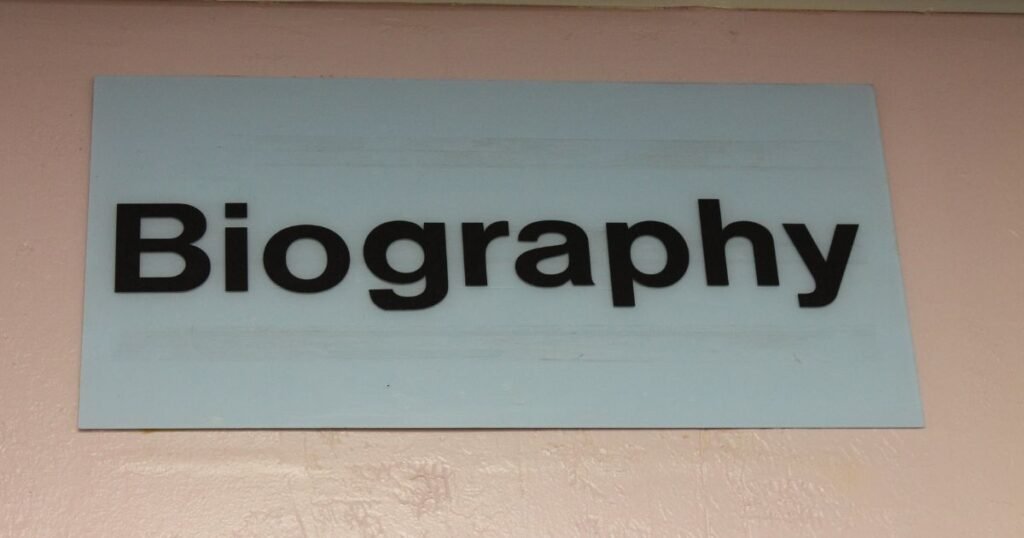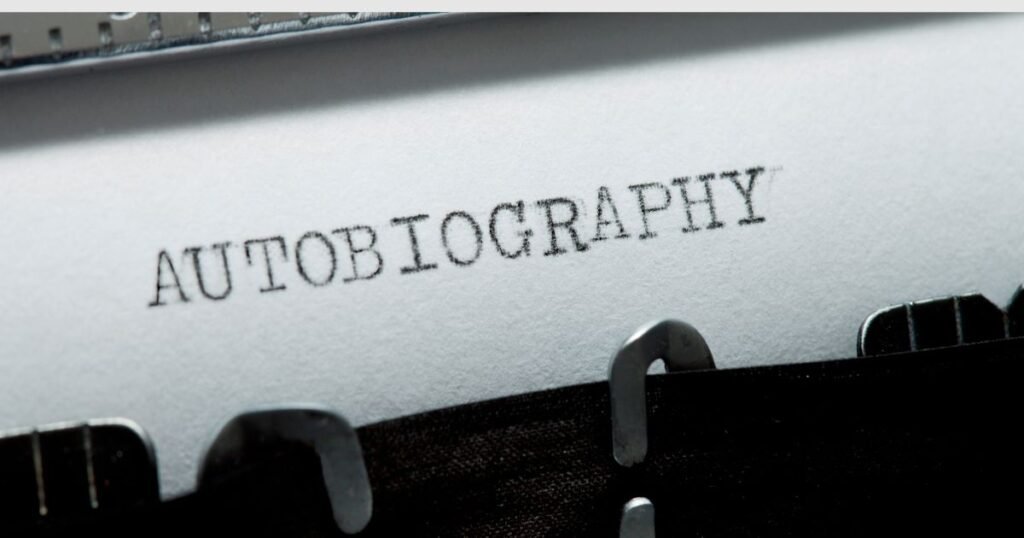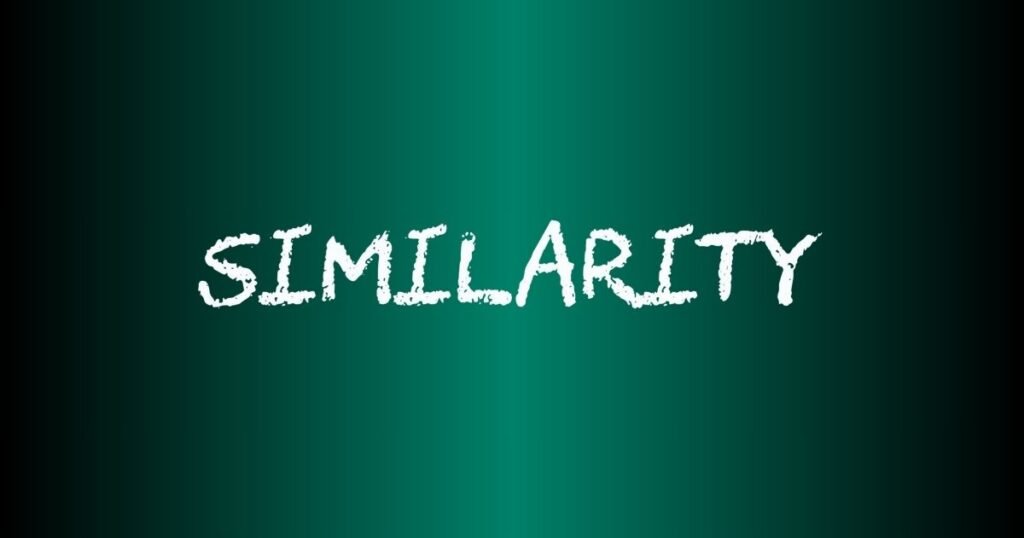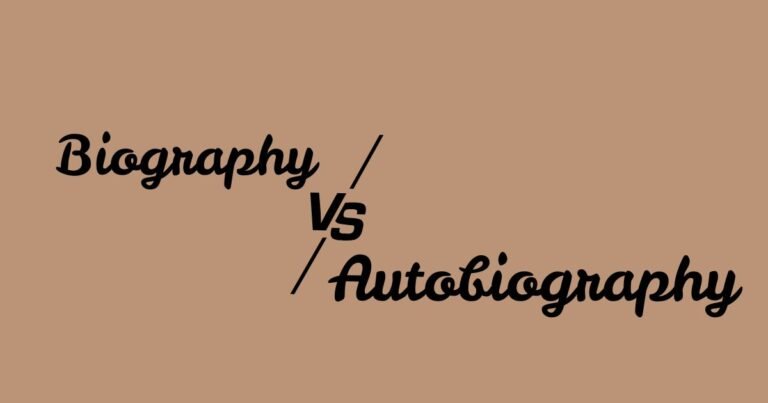Have you ever wondered what separates a biography from an autobiography? While both genres tell the life story of a person, their approach and purpose set them apart. Whether you’re a student trying to excel in a literature assignment, a writer deciding on the next big project, or simply an avid reader interested in life stories, understanding the distinction can shape the way you read, write, or even reflect on your own experiences.
This blog will walk you through the essentials of biography vs autobiography, their differences, similarities, and why they hold a special place in literature. By the end, you’ll not only grasp their unique qualities but also know when to read or write each form.
Table of Contents

What is a Biography?
Definition & Meaning
A biography is a detailed account of a person’s life written by someone else. It provides an in-depth look at an individual’s achievements, challenges, and the impact they have had on the world.
Who Writes It?
Biographies are written in the third-person perspective by a different individual, often a historian, journalist, or professional writer.
Purpose of a Biography
The main purpose of a biography is to inform and educate readers about the life of a particular figure. It strives to document facts accurately, presenting the subject’s story in a way that aligns with historical and contextual truths.
Key Elements of a Biography
- Factual Accuracy: Authenticity is critical, as biographies rely on evidence and research.
- Research-Based: Writers often use interviews, historical records, public speeches, and other documented materials.
- Storytelling: Even though it’s fact-based, a strong biography engages readers through compelling storytelling.
Famous Biography Examples
- Steve Jobs by Walter Isaacson
- Alexander Hamilton by Ron Chernow

What is an Autobiography?
Definition & Meaning
An autobiography is a self-written account of a person’s life. It’s their own perspective, told in their own words, offering a personal and emotional connection to their experiences.
Who Writes It?
Autobiographies are written in the first-person perspective by the individual who is the subject of the story.
Purpose of an Autobiography
The purpose of an autobiography is to provide personal insights and reflections on major life events, successes, and challenges. It’s a way for individuals to share their unique perspective and intimate experiences with readers.
Key Elements of an Autobiography
- Personal Experiences: Details about challenges, successes, and pivotal moments.
- Emotion and Perspective: Offers an emotional, subjective view of life events.
- Life Events: Typically highlights significant milestones.
Famous Autobiography Examples
- Becoming by Michelle Obama
- Long Walk to Freedom by Nelson Mandela
Key Differences Between Biography and Autobiography
| Feature | Biography | Autobiography |
|---|---|---|
| Written By | A different person | The subject themselves |
| Perspective | Third-person | First-person |
| Sources Used | Research, interviews, historical records | Personal memory, diaries, firsthand experiences |
| Purpose | To inform and educate readers | To share personal experiences and insights |
| Objectivity | More objective | Subjective (personal biases) |
Biographies tell stories from a more neutral, research-based point of view, whereas autobiographies are much more personal and often emotionally driven.

Similarities Between Biography and Autobiography
While there are key differences between the two genres, they also share several similarities, such as:
- Both tell the life story of an individual.
- Both include significant life events and milestones.
- Both require thorough research and accuracy regarding details.
- Both are widely appreciated in literature for their ability to inspire and educate.
Which One Should You Read or Write?
When to Read a Biography
If you’re looking to learn about someone’s life from an objective and factual standpoint, a biography is the way to go. Biographies often provide insight into historical achievements, cultural impacts, and the nuances of a subject’s life through meticulous research.
When to Read an Autobiography
If you want to connect with personal emotions, struggles, and reflections, autobiographies offer a more intimate perspective. They are particularly great for understanding how the author views their own life and legacy.
How to Decide What to Write
- Do you want to share personal experiences? Write an autobiography.
- Prefer researching and telling someone else’s story? Write a biography.
Importance of Biography and Autobiography in Literature
Biographies and autobiographies hold immense importance in literature and society for the following reasons:
- Historical Documentation: They preserve the lives and stories of influential individuals for future generations.
- Cultural Impact: They shed light on diverse perspectives and experiences, advancing understanding and empathy.
- Personal Inspiration: They motivate and inspire readers by showcasing real struggles, triumphs, and growth.
Famous historical figures and contemporary icons have relied on both genres to shape their legacy and share their stories with the world.
FAQs About Biography vs Autobiography
What is the main difference between a biography and an autobiography?
The main difference lies in authorship and perspective. A biography is written about someone’s life by another person, usually in the third person. An autobiography is written by the subject of the story, in the first person.
Can an autobiography be written by someone else?
No, an autobiography is specifically self-written. If someone else writes it, it would instead be classified as a biography or a ghostwritten autobiography with the subject’s input.
What are the best biography and autobiography books to read?
Some notable biographies include Steve Jobs by Walter Isaacson and Alexander Hamilton by Ron Chernow. For autobiographies, consider Becoming by Michelle Obama and Long Walk to Freedom by Nelson Mandela.
Is a memoir the same as an autobiography?
Not exactly. While both are written by the subject, an autobiography covers their entire life, while a memoir focuses on specific moments or themes.
Why You Should Add More Life Stories to Your Reading List
Whether you’re reading to gain historical insights, experience another person’s perspective, or simply find inspiration, biographies and autobiographies provide unparalleled glimpses into human life.
If you’re a writer, these genres also offer unique opportunities to explore storytelling, self-reflection, and the art of capturing life itself.
Start exploring today! Discover a biography or autobiography that speaks to you and immerse yourself in the fascinating world of life stories.

